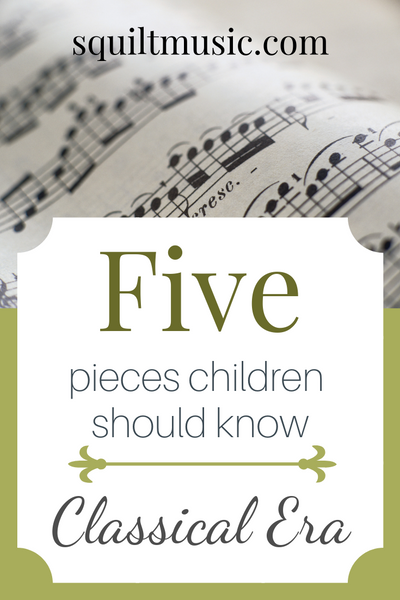5 Pieces Children Should Know From the Classical Era
The Classical Era of music (1750-1820) contains pieces by the musical giants Haydn, Mozart, and Beethoven.
The music of this time period reflects a sense of order and precision in the world at that time. Reason and logic began to shape thinking. It was The Age of Enlightenment.
Specific forms of music became prevalent; the concerto, symphony, and sonata were dominant forms during the Classical Era.
The piano was an important instrument during this era, and the orchestra got larger.
The music of the Classical Era is a feast for young ears!

As our children listen to this music they can become immersed in the time period; they can become immersed in their own imaginations and wanderings.
How often do we allow children to simply just LISTEN - to simply just ENJOY?
Five Pieces of Music From the Classical Era
The following five pieces are a wonderful introduction to the Classical Era. Use them during meal times, in the car, or during your homeschooling morning time. Play them during nap time, while working around the house, or while settling down for the evening.
You will find that with repeated exposure your children will come to crave beautiful music, and that is a wonderful thing.
"Surprise" Symphony by Franz Joseph Haydn
The second movement of this piece is where the nickname "Surprise" comes in.
Can your children hear the surprise?
It is said that Haydn included this to wake up some of his audience members because he didn't appreciate that they hadn't gotten too complacent during concerts and were falling asleep!
Flute & Harp Concerto in C Major by Wolfgang Amadeus Mozart
Mozart was one of the pioneers of the concerto - a work for solo instrument and orchestra.
The transverse flute was new during the Classical Era - part of the expanding woodwind family. The harp, interestingly enough, wasn't yet considered an orchestral instrument.
The combination of these two instruments is simply beautiful.
Minuet by Luigi Boccherini
This minuet, also known as the "Celebrated" Minuet, is part of a string quintet by Boccherini.
Luigi Boccherini was an Italian cellist and composer, and he is primarily remembered just for this minuet - a one-hit wonder if you will.
Ave Maria by Franz Schubert
Perhaps one of the most recognized songs in Classical Music, Ave Maria was actually named "Ellen's Third Song" - later called Ave Maria by singers because it is a prayer to the Virgin Mary.
(You can read the Latin text and its translation here.)
Born in Austria in 1797, Schubert is considered a late Classical Era composer - and oftentimes is claimed by the Romantic Era.
Fifth Symphony by Ludwig van Beethoven
Beethoven's fifth is perhaps THE most famous piece in all of classical music.
Beethoven was in his mid 30s at the time of the composition, and he was in the middle of going deaf. He also found himself in the middle of the Napoleonic Wars. The turmoil of these events can obviously be heard in this symphony.
This piece is also considered to a bridge to the Romantic Era; you will notice it sounds very different than the music of Franz Joseph Haydn, for example.
At SQUILT Music Appreciation, we specialize in bringing the music of all ersa ALIVE for children.
The following resources will help your children learn more about music from the Classical Era:
SQUILT Volume 2: Classical Era
Meet the Composers: Exploring Great Music
Composer Spotlight: Mozart
In April 2019 we are also exploring the Classical Era in depth in our SQUILT LIVE! lessons.
We will have lessons about Haydn's Surprise Symphony and Beethoven's Emperor Piano Concerto. Additionally, students will receive a listening calendar for the month with a curated selection of Classical Era music for each day.
Join us in SQUILT LIVE! today!
Do you have a favorite piece of music from the Classical Era?


Wow!My favorite composer is John Williem.